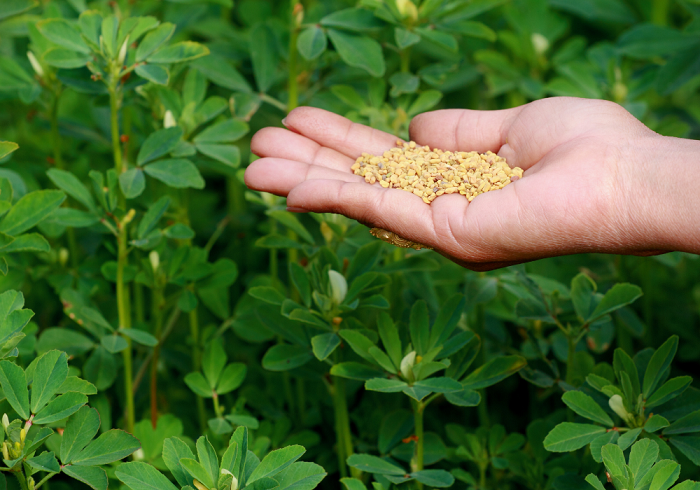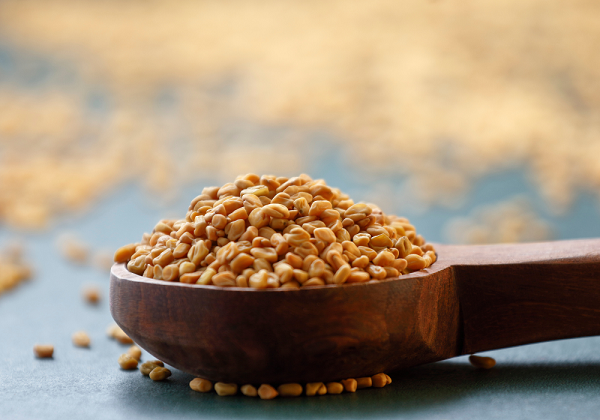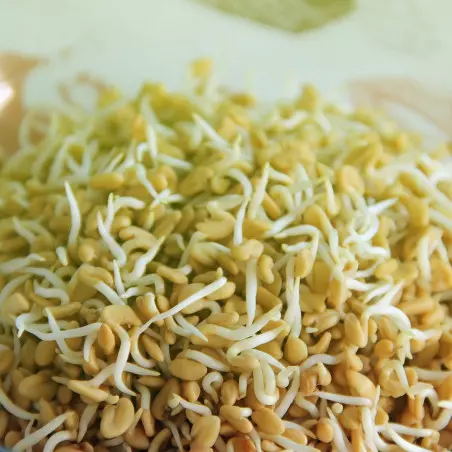LeThe fenugreek It is a herbaceous plant native to Asia and the Mediterranean. For thousands of years, it has been used as Spice, , medicinal herb and dietary supplement "in many cultures."
Over time, scientific research has highlighted the health benefits of fenugreek. It contains many chemical compounds that possess numerous properties and benefits. In this article, we will examine the health advantages of fenugreek, as well as its potential to improve libido in men.
About fenugreek
Also known as fenugreek, or scientifically as Trigonella Foenum-Graecum, it is an herbaceous plant belonging to the Fabaceae family. It is primarily cultivated in Asia and the Mediterranean basin, specifically in North Africa, for its aromatic seeds and edible leaves. fenugreek seeds They have a slightly bitter flavor and are often used as a spice in cooking, and their leaves are also consumed fresh or dried as an aromatic herb in certain cuisines.
Fenugreek is used in traditional medicine in many cultures to treat various health issues, including reduce inflammation, , regulate blood sugar levels "and the" cholesterol, , increase milk production in breastfeeding women and improve libido in men. Its seeds, enriched with bioactive compounds such as saponins, flavonoids, alkaloids, mucilaginous fibers, and amino acids, offer medicinal and antioxidant properties beneficial to human health. The antioxidant properties of these small seeds help combat free radicals, thereby reducing oxidative stress in the body, which can be beneficial for cardiovascular health and contribute to the prevention of these diseases.
The seeds of this medicinal plant are available in the form of capsules, powder, tablets, and infusions, and are often used in dietary supplements for their health benefits.
Is fenugreek an aphrodisiac ?
Fenugreek is often considered a natural aphrodisiac, it is the alternative to Viagra in natural medicine. However, although some studies have suggested that fenugreek It may have positive effects and beneficial properties on male libido, but the scientific evidence in this regard is limited and contradictory, and does not allow for a definitive conclusion on the effectiveness of fenugreek as a natural aphrodisiac.
Men use fenugreek as a supplement to boost testosterone, a hormone that plays a key role in male sexual function. A study conducted in 2011 on 60 healthy participants, aged 25 to 52, had some receive a fenugreek supplement while others received a placebo for six weeks. The results showed that the men who received fenugreek experienced a significant increase in desire and sexual satisfaction compared to the men who received the placebo, as well as a significant increase in testosterone levels and an improvement in sperm quality among the participants.
However, other studies have found no conclusive evidence of the effectiveness of fenugreek as an aphrodisiac. It should be noted that the use of fenugreek supplements to enhance sexual functions should not be considered a substitute for conventional medical treatments for sexual health issues.

Is fenugreek useful for bodybuilding ?
Fenugreek is often used as a dietary supplement to promote muscle growth and improve physical performance. fenugreek seeds contain active ingredients, such as saponins and alkaloids, which are believed to have beneficial effects on body composition and physical performance.
Some studies have suggested that fenugreek can increase muscle mass and strength in individuals who engage in regular physical activity. After exerting this physical effort, testosterone levels drop, so athletes turn to fenugreek because the saponins present in fenugreek can help stimulate testosterone production and replenish their muscle tissues.
Fenugreek is an abundant source of nutrients, providing up to 30% protein to your body. Additionally, it is renowned for its anti-inflammatory properties and for its long-lasting strengthening of the immune system.
Does fenugreek affect testosterone ?
It has been demonstrated that fenugreek can increase testosterone levels in men. According to a study conducted on healthy men, it has been proven that consuming fenugreek seeds reduces the risk of impotence and improves their fertility and libido. It helps men regain a fulfilling sex life by increasing their level of arousal, as well as their energy and endurance.
It should be noted that an excessive increase in testosterone can lead to undesirable side effects such as acne, excessive hair growth, and behavioral changes.
Tips for consuming fenugreek
Fenugreek is available in various forms, including powder, capsules, tablets, tea, and whole seeds. Here are some common ways to consume fenugreek:
The most effective, make it sprout: Germination activates the seed and multiplies its benefits. When the fenugreek seed begins to sprout, it releases all the nutrients, enzymes, vitamins, etc., that it needs to become a plant. Sprouted fenugreek is therefore a bioavailable concentrate for our body of all the elements present in the dormant seed. Thanks to this natural process, the sprouted seeds offer a maximum concentration of essential nutrients, making them particularly beneficial for our health.
Use fenugreek powder as a spice in cooking or its leaves: Fenugreek powder is commonly used as a spice in Indian, Middle Eastern, and North African cuisine. It can be added to curries, soups, stews, and marinades to impart a slightly bitter and nutty flavor. Meanwhile, fresh or dried fenugreek leaves can be used as an aromatic herb in soups, salads, sauces, and marinades. Fresh leaves have a slightly sweet flavor and a nutty aroma.
Make a fenugreek seed infusion: Fenugreek seeds can be used to prepare a nutrient-rich infusion. To prepare the infusion, soak a teaspoon of fenugreek seeds in a cup of hot water for about 10 to 15 minutes. You can add honey or lemon to sweeten the taste, if desired.
Take fenugreek capsules or tablets: Fenugreek capsules or gel caps are a convenient way to consume fenugreek as a dietary supplement. The recommended dosages vary depending on the product, so be sure to follow the manufacturer's instructions.
Add sprouted fenugreek seeds to your dishes: Whole fenugreek seeds can be added to all your savory dishes, salads, sandwiches, or soups to add a herbal flavor and a crunchy texture. Additionally, they are a traditional ingredient in Methi salad, where they bring their distinct aroma and health benefits.
How much fenugreek should be consumed per day ?
In general, it is recommended to consume about 5 grams of fenugreek per day. If you wish to follow a treatment, it is advised to do it for 3 to 4 weeks with a 1-week break if you want to repeat it. Doing this fenugreek treatment 2 to 3 times a year is more than sufficient. However, it is important to follow the specific instructions of the product and not to exceed the recommended dose.
It is also worth noting that consuming fenugreek in high doses can lead to undesirable side effects, including digestive issues, muscle weakness, and a decrease in blood sugar levels. Therefore, it is important to consult a healthcare professional, especially if you are taking medications or have underlying health conditions.

Does fenugreek increase blood pressure ?
Fenugreek may have hypotensive effects, meaning it can help reduce blood pressure in some people. A study published in the scientific journal "Phytotherapy Research" in 2017 was conducted on 60 people with mild to moderate hypertension. The participants were randomly divided into two groups: one group received capsules containing 500 mg of fenugreek, while the other group received placebo capsules (without active substance).
The participants took the capsules twice a day for six months. During this period, they were regularly monitored by healthcare professionals to track their blood pressure and other health parameters.
The results showed that the group that had taken fenugreek experienced a significant reduction in blood pressure compared to the placebo group. Specifically, systolic blood pressure (the pressure in the arteries when the heart beats) decreased by an average of 9.58 mmHg in the fenugreek group, compared to a decrease of only 2.12 mmHg in the placebo group. Diastolic blood pressure (the pressure in the arteries when the heart is at rest) also decreased more in the fenugreek group than in the placebo group.
However, it is important to note that the effects of fenugreek on blood pressure can vary from person to person, and side effects may also occur. For example, in some individuals, fenugreek can cause allergic reactions or an excessive decrease in blood pressure, which can lead to dizziness and fatigue. Therefore, it is important to consult a healthcare professional before taking fenugreek supplements or adding fenugreek to your diet.






